|
|
|
Sort Order |
|
|
|
Items / Page
|
|
|
|
|
|
|
| Srl | Item |
| 1 |
ID:
142128
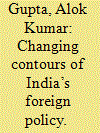

|
|
|
|
|
| Summary/Abstract |
Undoubtedly, Modi’s international engagements were a continuation of India’s foreign policy under the preceding UPA government led by Congress. But he injected a new energy into the relationships with neighbours like Bhutan and Nepal, and major powers like China and the US. The present political leadership has made clear to the immediate neighbourhood that India is ready to share its prosperity because the policy makers understand peace could be established only through prosperity and would enhance constructive engagement and a more integrated and inter-connected sub-continent. Modi rather than making India a marginal receiver of the dispensation of the international system has lifted India’s status as one of the dispensation of the international system.
|
|
|
|
|
|
|
|
|
|
|
|
|
|
|
|
| 2 |
ID:
142132


|
|
|
|
|
| Summary/Abstract |
The contributions of Modi in the field of foreign policy have been his visits to Bhutan and Nepal after becoming the prime minister which was unheard of earlier. That has boosted the Himalayan spheres which were ignored for almost seven decades. His invitation to the heads of these countries for his oath taking ceremony was to continue the trajectory of good friendly relations with neighbours while also removing any apprehensions of these nations against India. He seems to be determined to streamline the sea route of India which became the easy route of terrorist outfits. Moreover he has been trying to connect India with the disconnected part of the world. These factors will pay great dividends in the future if India is sincerely committed to shape a strong strategic culture through its cohesive foreign policy.
|
|
|
|
|
|
|
|
|
|
|
|
|
|
|
|
| 3 |
ID:
142131
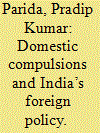

|
|
|
|
|
| Summary/Abstract |
We have to bring some sort of rough consensus among all the groups, political parties, ideological groups, ethnic groups regarding number of domestic issues. Rather our differences of opinion should not be known to outside. It must be solved within. Then only we can think of a strong foreign policy having rooted in domestic issues, with more or less consensuses among all the stakeholders. Today, as India itself has moved to the center of global politics with an increase in its economic and military capabilities, it is being asked to become a stakeholder. India is a rising power in an international system that is in flux, and it will have to make certain choices that probably will define the contours of Indian foreign policy for years to come. The stakes are too high for India as well as the international community.
|
|
|
|
|
|
|
|
|
|
|
|
|
|
|
|
| 4 |
ID:
142123
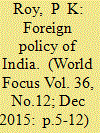

|
|
|
|
|
| Summary/Abstract |
The foreign policy of a country is conceived, designed, and formulated to safeguard and promote its national interests, in her external milieu, in the conduct of relations with other countries, bilaterally and multilaterally. It is a direct reflection of a country’s traditional values and overall national policies, her aspirations and self-perception. In the Indian context, the aim and objective of the Foreign Policy of India is that of an independent, developing and democratic country, to safeguard and promote its national interests and be the enabler of Indian developmental processes through positive and proactive external engagement. It is to be a facilitator of economic development and an instrument to ensure security from external threats so as to bring prosperity to the people of India. It seeks to leverage international relationships in enhancing trade and investment, in assisting infrastructure development, technology transfers to boost manufacturing sector and establish peace and tranquillity in the region.
|
|
|
|
|
|
|
|
|
|
|
|
|
|
|
|
| 5 |
ID:
142125
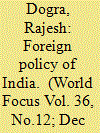

|
|
|
|
|
| Summary/Abstract |
A grand external strategy would require that interactions between different strategic objectives be examined to arrive at the right balance. There is clearly a possibility of a trade off between some interactive objectives, and even between components of an objective. Despite the heightened expectation of the global community, the implications of India’s enhanced role in global issues and governance needs to be looked at within the parameters of its growth and security objectives. In case of contradictions, the former should be given lower priority in the conduct of the country’s foreign policy. This does not, in any sense, imply an abdication of global responsibilities, but rather that India cannot afford to let them pose a trade-off on the more important aspects of its national security. Today standing on the crossroads of global highways of the international politics and relations, it is India’s moment of millennial opportunity. The challenge is to convert the national hope into reality. To make a great leap in congruence to our collective Vision of 2020, an intellectual foreign policy is the only panacea for all evils.
|
|
|
|
|
|
|
|
|
|
|
|
|
|
|
|
| 6 |
ID:
142129
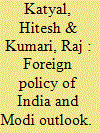

|
|
|
|
|
| Summary/Abstract |
India has followed certain basic principles in the conduct of its foreign policy from which it has not deviated much. In fact some of its basic features such as non-alignment still remain significant and relevant. Even as India is poised to become an economic power in the coming times, it always has and in future too will take necessary steps to save its national interest in every respect i.e. political, strategic and economic terms. India’s foreign policy has been marked by a continuous, progressive change post-1980s based on pragmatic principles. While before 1980 India was primarily supported by the Soviet Union, post-1980s India has dropped all its erstwhile ideological baggage and is cooperating closely with USA, EU, BRICS and East Asia. It has maintained its old relations, albeit in a new avatar, and issues of economics, energy, etc., play a very important role in determining India’s foreign policy today. Its relations with China and USA are maturing, and India is also looking at making inroads into uncharted territories of Africa. India has finally realized that it needs to become practical in its approach to foreign policy if it has to survive in a tough neighbourhood as well as take up leadership positions globally. If Modi truly intends to make foreign policy one of his legacy issues, he will need to sustain the various initiatives that he has undertaken. One is India’s self-perception about its role in world affairs. It aspires to be a major power, but continues to cling to its Third Worldism; it would like to influence events but shies away from proactive policymaking. Second, is India’s perception of the impact of China’s role in world affairs and its response.
|
|
|
|
|
|
|
|
|
|
|
|
|
|
|
|
| 7 |
ID:
142124
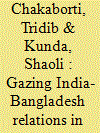

|
|
|
|
|
| Summary/Abstract |
The thumping victory of the 2014 Lok Sabha Election gave Modi a better space to initiate Act East Policy with Bangladesh. Within this short span of time, his gesture towards the Bangladesh government remains quite constructive in its entirety. One of the prime goals of current NDA government was to ‘Make in India’ where inviting foreign investment remains the core idea. To implement this, India needs better connectivity with its immediate neighbors, where Bangladesh, Myanmar and North-Eastern states are directly connected and Nepal and Bhutan are indirectly connected. This connectivity constitutes the major component of India’s current Act East Policy, where economic improvement of the North-Eastern region also remains a prime segment. It is too early to evaluate the current NDA government’s performance with the past government, because both initiated better ties with Bangladesh. However the current trend of Modi’s outlook towards Bangladesh is way ahead of its predecessor. This positive outlook of India was evident from the speech delivered by Prime Minister Narendra Modi, at Dhaka on 6 June, 2015, where he said: “We are not just neighbours. We are two nations bound by the threads of history, religion, culture, language and kinship - and, of course, passion for cricket….We will work together to harness the rich potential of our relationship. And, we will address our challenges in a spirit of friendship and from a position of mutual trust and confidence”.This is no doubt a major pragmatic shift of India’s Bangladesh policy in recent times under NDA government and it is hoped that it would perform much better than the past years and also for the come days.
|
|
|
|
|
|
|
|
|
|
|
|
|
|
|
|
| 8 |
ID:
142141
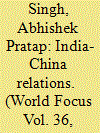

|
|
|
|
|
| Summary/Abstract |
India's trade deficit with China is set to reach record levels in 2015, new trade figures show, with the imbalance after the first three quarters of the year already nearing last year's mark. As India has grown its consumers and corporations have been importing an increasing amount of China’s affordable products but India’s exports to China have not kept pace. While China has a cost advantage in most products, analysts say India is very competitive in the pharmaceutical, textile and some services sectors. That is where it needs more access if it wants to start to rectify the skewed trade balance. Similarly, frictions along the border and Chinese incursions mounted in recent years remain a serious security concern for India. This provides ample scope for anti-China constituency in India. Also China’s solidarity with Pakistan has wider ramifications, especially from an Indian standpoint towards bilateral relations.
|
|
|
|
|
|
|
|
|
|
|
|
|
|
|
|
| 9 |
ID:
142126
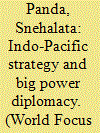

|
|
|
|
|
| Summary/Abstract |
India’s presence in the IO is limited though it has numerous trade routes favouring maritime trade for a number of countries. But over the years it is used in a manner adversarial to India’s interests. China has connected with more littorals in the Ocean and cautioned India against considering it as its “backyard”. Chinese sources deny its expansionist objective in the IOR. But India should not be complacent, rather it should improve its activities in the region for ensuring stability in the environment to expedite socio economic development.
|
|
|
|
|
|
|
|
|
|
|
|
|
|
|
|
| 10 |
ID:
142127
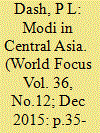

|
|
|
|
|
| Summary/Abstract |
Let us assume that the ‘emperor of India’, Narendra Modi undertook his maiden voyage to Central Asian capitals and Ufa in his special plane Air India One. His intention was to clear the doubt in public perception that he neglected India’s extended neighborhood. Modi ventured into a land where there is no clear ‘India policy’ even after a quarter century of independence. Yet Modi wished to meet and confabulate with the Presidents of these countries within the span of just a week; the purpose of his visit, Indian interests and how both sides could harness their potential for mutual benefit.
|
|
|
|
|
|
|
|
|
|
|
|
|
|
|
|
| 11 |
ID:
142143
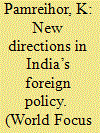

|
|
|
|
|
| Summary/Abstract |
India aspires to be a global power and it certainly has that capability. However, primary challenges lie in the domestic fields of activities; the issues of governance and the pressing problem of corruption, badly undermining India’s core strategy of inclusive growth. The poor state of governance leaves it vulnerable to cross-border problems, to address these domestic issues; India needs to reinforce the righteous circle that is inherent in its liberal and democratic structures and traditions. In fact, addressing issue of policing will be vital to the all-embracing effort to achieve better governance and security. If India does not carry out the governance reforms, it is likely China will continue to command economically and militarily in this century. (Gordon 2015) understands that in order to fully realise its potential and emerge as a truly global power, India has first to neutralise threats originating in South Asian by concentrating on the domestic and neighbourhood sphere of activity. Its goal to be a global player would be realised not necessarily in terms of military assets, but more in terms of other global skill such as possessing vigorous globally connected financial, commercial, industrial, research and educational sectors and developing as trading and investment partners with the quality of rule of law that is needed to play a genuine global economic role. In fact, domestic political stability, peace and equitable economic growth of all sections of society is a sine qua non for India to achieve its goal of emerging as a major power. Since the launch of economic reformsin 1990s, India has been growing persistently. The shift from Non-Alignment to multi-alignment is a national policy; over the last decades India has built up its political, economic and strategic relations with practically every major country. For India to be one key player, it needs to maintain its ethos, culture, heritage and longing for world peace. In fact, it is because of this legacy that India’s emerging today is to seen with no suspicion and fear.
|
|
|
|
|
|
|
|
|
|
|
|
|
|
|
|
| 12 |
ID:
142138
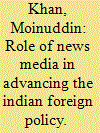

|
|
|
|
|
| Summary/Abstract |
Most of the media moments are spectacles without a deep content. We have limited write-ups scrutinizing the foreign tours of the Prime Minister. The News media does not regularly discuss foreign policy issues, contours of international relations and only indulge in real politic. Indian media should impartially deconstruct the personality cult with national interests. Their understanding of national interests should be broad and visionary. Some experts’ association with some institutions and their personal biasness should not come in way of evaluating the national interests.
|
|
|
|
|
|
|
|
|
|
|
|
|
|
|
|
| 13 |
ID:
142130
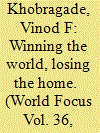

|
|
|
|
|
| Summary/Abstract |
Prime Minister Narendra Modi has brought great transformation in India’s foreign policy especially by adopting the commercial and cultural diplomacy. Mr. Modi could attract the investments from the US $45 billion, Japan $35 billion, China; $28 billion and further from Canada and European countries France and Germany. Mr. Modi’s inclusive cultural diplomacy has been most fantastic which achieved higher level of appreciation. Without doubt, there is a grand ‘Modi’fication of India’s foreign policy in a very positive direction. However, Mr. Modi’s engagement with his own people in India is very much under the scanner. He seems to distance himself from the masses and getting close to the people around the world especially the Diaspora, business tycoons and technocrats and software tycoons. Due to his very busy foreign tours, he is unable to look into the domestic affairs and crisis. He has heroic appearance at the world stage, but his role in the domestic policy matters before the common masses appears to be questionable. Mr. Modi’s responsibility as the prime minister is optimum and therefore, the prevailing circumstances in India urgently need his intervention.
|
|
|
|
|
|
|
|
|
|
|
|
|
|
|
|
|
|
|
|
|